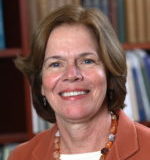
In the U.S., more than a third of elderly patients discharged from hospitals are re-admitted within 90 days, often needlessly. An intervention that is helping change that is the nursing-led Transitional Care Model (TCM), pioneered at the University of Pennsylvania. It been the focus of four large scale NIH-funded clinical trials, including three RCTs, all finding consistent positive health and economic effects, including reduced re-hospitalization and health care expenditures. The savings, in fact, are equivalent to about $10 billion if the approach were implemented nationwide. Today TCM is being used in a range of health systems in the U.S., although data suggest that the model’s uptake is sporadic and slow relative to its promise.
To learn more, we’re joined by the principal investigator of this research, Mary Naylor. She is a Professor in Gerontology and Director of the New Courtland Center for Transitions and Health at the University of Pennsylvania School of Nursing. Our conversation covers the TCM model, the research findings, as well as some of the challenges of getting evidence-based innovations like the TCM into wider usage by practitioners.